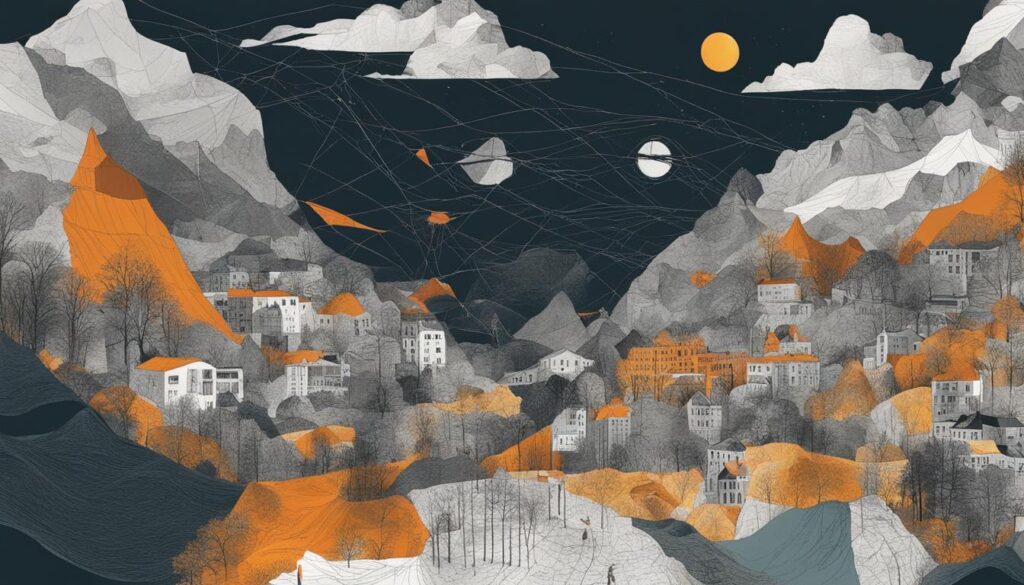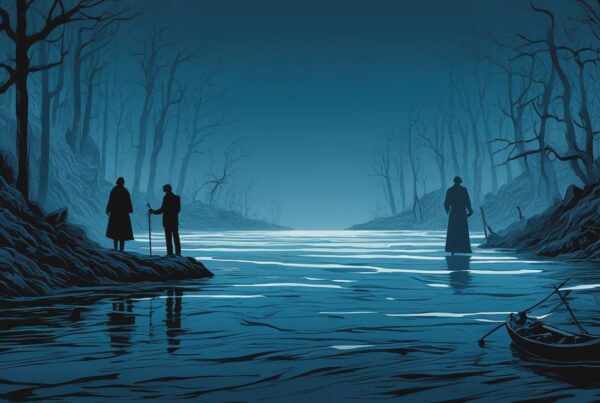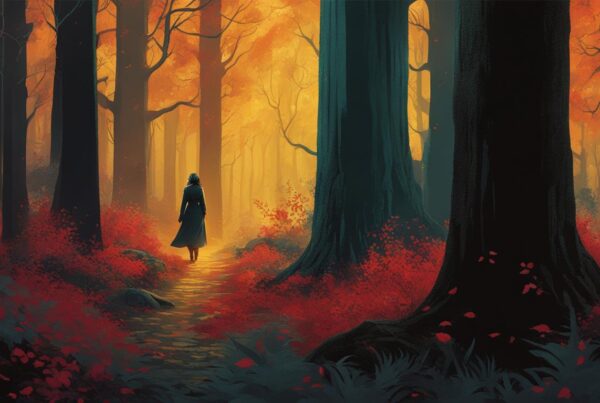If you’re looking for a book that will leave you pondering its themes long after you’ve finished reading it, you won’t go wrong with “Lost Children Archive” by Valeria Luiselli. This audiobook review will discuss what makes this novel so special, as well as its author’s background and writing style. If you’re a fan of audiobooks or interested in exploring the works of Valeria Luiselli, keep reading to learn more.
About the Author, Valeria Luiselli
Valeria Luiselli is a Mexican author known for her elegant and intricate writing style. Born in Mexico City in 1983, Luiselli spent her early years traveling across South Korea, South Africa, and India. Her global experiences and multicultural upbringing inspired her to pursue a career in writing, leading to the publication of her first novel, “Faces in the Crowd,” in 2011. Since then, she has gained critical acclaim for her unique writing style and exploration of complex themes, including migration, identity, and the human experience.
Before releasing “Lost Children Archive,” Valeria Luiselli’s work was already making waves in the literary scene. Her book “Tell Me How It Ends: An Essay in 40 Questions” received widespread acclaim for its poignant exploration of the United States’ immigration system, while her novel “The Story of My Teeth” was a finalist for the National Book Critics Circle Award.
Synopsis of “Lost Children Archive”
“Lost Children Archive” by Valeria Luiselli tells the story of a family of four on a road trip from New York to Arizona in search of a lost civilization of Apaches. Their journey, however, becomes an exploration of personal, familial and national identity against the backdrop of a deeply divided country. As the family’s road trip progresses, their relationships with one another and the world around them are tested to the limits. The novel is a haunting and thought-provoking exploration of themes including migration, loss, and the power of storytelling.
Plot Summary
| Chapter | Summary |
|---|---|
| Prologue | The narrator introduces herself and her husband, who is working on a project called “The Apaches of New York.” |
| Part One: Documenting | The couple, along with their two children, embark on a trip across the country. As they travel, the narrator reflects on her experiences working with children who have crossed the US-Mexico border. |
| Part Two: Listening | The family settles into a vacation house in Arizona, where the narrator’s husband continues his project. The narrative shifts between the perspectives of the family members and a group of undocumented immigrants they encounter. |
| Part Three: Crossing | The family’s trip takes a dark turn when their son takes off with a friend and they fail to return. The panicked parents launch a search, bringing to the surface the vulnerabilities and anxieties simmering below the surface of their seemingly idyllic family life. |
| Epilogue | The narrative concludes with an open-ended reflection on the implications of the journey for the family, the immigrants they encountered, and the country as a whole. |
The novel’s intricately woven plot and multi-layered narrative create a mesmerizing portrait of one family’s journey through the vast American landscape, and the complex, often fraught, relationships they have with one another and the world around them.
Narrative Style and Structure
In “Lost Children Archive,” Valeria Luiselli employs a unique and thought-provoking narrative style and structure that enhances the reading experience. Rather than a traditional linear plot, the story unfolds through a series of fragmented narratives, intersecting and overlapping to create a layered and immersive tale. Luiselli seamlessly weaves together various forms of storytelling, such as journal entries, dialogues, and soundscapes, to create a multidimensional narrative that engages all of the senses. This narrative style challenges the traditional notions of storytelling and encourages readers to become active participants in piecing together the story.
Additionally, Luiselli’s use of structure is equally impressive. The novel is structured around a family road trip from New York to Arizona, a journey documented through the lens of storytelling. The narrative is split into two parts, one that follows the husband and the other that follows the wife, with each part reflecting their perspectives on the journey and their evolving family dynamics. The novel also includes interspersed recordings of echoes, landscapes, and birds, which function as a sonic backdrop to the narrative and contribute to the immersive world-building. Overall, the narrative style and structure of “Lost Children Archive” are a testament to Luiselli’s skill as a storyteller, providing a captivating and memorable reading experience.

Characters and Their Journey
Valeria Luiselli’s “Lost Children Archive” features a cast of vivid and complex characters that bring the story to life. The two main characters, the unnamed parents, are documentarians who set out on a road trip with their children to record the sounds of America. As they travel, they also contemplate their own marriage and the challenges they face as a family.
The children, a boy and a girl, are also fully realized characters with their own distinct personalities and perspectives. The boy is interested in cartography and creates maps of their journey, while the girl is more introspective and reflects on her own sense of displacement and belonging.
Through these characters, Luiselli explores the themes of family, identity, and migration, showcasing the emotional complexities of the human experience. As the characters navigate through their individual journeys, readers are taken on a thought-provoking and deeply moving exploration of the human condition.
Character Development
One of the strengths of “Lost Children Archive” is the compelling character development throughout the story. As the characters face various challenges and conflicts, they undergo significant growth and change over the course of the novel, making them all the more relatable and engaging for readers.
Journey
The journey that the characters embark on is not merely a physical one, but an emotional and psychological one as well. Through their travels and experiences, the characters confront their own feelings of displacement, loss, and longing, resulting in a deeply resonant and unforgettable story.
Themes Explored in “Lost Children Archive”
Valeria Luiselli’s “Lost Children Archive” is a poignant exploration of the powerful themes of migration, family, and storytelling. The novel highlights the impact of migration on the lives of individuals and families, giving readers a glimpse into the complexities and challenges faced by those who leave their homes in search of a better life.
The story also delves into the intricacies of family dynamics, examining the relationships between spouses, parents and children, and siblings. Luiselli’s exploration of family ties and the struggles that accompany them is both heart-wrenching and insightful, allowing readers to connect with the characters on a deep emotional level.
Beyond its examination of migration and family, “Lost Children Archive” also places significant emphasis on the power of storytelling. Through this lens, the novel invites readers to consider how narratives shape our understanding of the world, and how our personal stories can both empower and limit us as individuals.
The Impact of Migration
The theme of migration is central to “Lost Children Archive,” touching on issues of border politics, cultural identity, and the human cost of displacement. The book provides an intimate look at the experiences of migrants, portraying their struggles, fears, and hopes in a moving and relatable way.
The Complexity of Family Dynamics
The story of “Lost Children Archive” is intimately bound up with themes of family, exploring the intricate relationships between parents and children, as well as the complex dynamics of love, responsibility, and sacrifice. The novel is a powerful reminder of the impact of trauma and the ways in which familial bonds can both help and hurt.
The Significance of Storytelling
At its core, “Lost Children Archive” is a meditation on the role of storytelling in the human experience. Luiselli artfully weaves together multiple narrative threads to create a rich tapestry of personal histories, shedding light on the ways in which individual stories are shaped and influenced by the larger cultural narratives that surround them.
Immursive Audiobook Experience
For those who prefer to listen to books, the audiobook version of “Lost Children Archive” provides an immersive experience of the story. The narration, skillfully performed by acclaimed voice actor X, brings the characters to life and captures the emotional depth of the novel.
The audio production of “Lost Children Archive” is of the highest quality, with clear and crisp sound that allows listeners to fully engage with the story. The book’s unique structure, which includes a mix of narration, dialogue, and excerpts from other sources, is expertly translated into the audio format.
Listeners can gain a greater appreciation for Valeria Luiselli’s writing style and narrative technique when experiencing the audiobook version of “Lost Children Archive.” The emotion and tension in the story are intensified by the audiobook’s pacing and rhythm, making for a truly enthralling listening experience.

Experience the powerful storytelling of “Lost Children Archive” through the audiobook format which offers skillful narration and excellent audio production that brings the story to life.
Critical Reception of the Audiobook
Since its release, the audiobook version of “Lost Children Archive” has garnered critical acclaim from renowned critics and readers alike. The production has been praised for its immersive storytelling, elegant prose, and outstanding narration, making it a standout listening experience.
Booklist’s review describes the audiobook as “stunningly performed” and “mesmerizing,” with the narrator’s “rich, textured voice” bringing the story to life. AudioFile Magazine also commends the audiobook, stating that “the author’s blend of fiction and nonfiction is beautifully enhanced by the audio format.” They commend the narrator’s ability to masterfully portray the complex characters and settings in the book, evoking an emotional connection with the listener.
Overall, the critical reception of the “Lost Children Archive” audiobook has been overwhelmingly positive, with many praising it as a transcendent literary experience. For those seeking an engaging and thought-provoking listening experience, the audiobook is a highly recommended choice.
Literary Analysis and Themes
In “Lost Children Archive,” Valeria Luiselli masterfully employs various literary techniques to explore profound themes that resonate with readers on a universal level. Through a combination of vivid imagery, lyrical prose, and intertextuality, Luiselli creates an intricate and multi-layered narrative that demands a closer examination.
Literary Techniques
One of the most striking literary techniques employed by Luiselli is her use of intertextuality. By weaving in references to other works of literature, Luiselli creates a metafictional layer that both enhances the reading experience and adds depth to the narrative. For example, Luiselli incorporates elements of the classic novel “The Oregon Trail” into “Lost Children Archive,” drawing parallels between the experiences of migrants in both narratives.
In addition to intertextuality, Luiselli employs vivid imagery to create a sense of place and immerse the reader in the setting. Through descriptive language and sensory details, Luiselli brings to life the various landscapes traversed by the characters, capturing both their beauty and their harshness.
Themes Explored
At its core, “Lost Children Archive” is a novel about migration, family, and storytelling. Luiselli explores the complexities of family relationships and the impact of migration through the lives of her characters, highlighting the ways in which these experiences shape their identities and worldview.
Furthermore, Luiselli emphasizes the power of storytelling as a means of both processing and communicating experiences. Through various narrative techniques, Luiselli blurs the lines between fact and fiction, challenging readers to consider the nature of storytelling and its role in shaping our understanding of the world.
Possible Interpretations
Through her intricate storytelling and exploration of complex themes, Valeria Luiselli leaves plenty of room for interpretation and analysis. One possible interpretation is that Luiselli is making a statement about the importance of empathy and understanding in a world where migration and displacement are increasingly prevalent issues.
Another possible interpretation is that Luiselli is exploring the concept of cultural hybridity and the ways in which experiences of migration can lead to the creation of new cultural identities. By interweaving elements of various cultures and literary traditions, Luiselli suggests that identity is always in flux and that it is shaped by a multitude of factors.
Comparisons to Other Works
In this section, we will compare “Lost Children Archive” to other notable works of literature that touch on similar themes. One such work is “The Grapes of Wrath,” written by John Steinbeck. Both novels explore the experiences of migrant families and the challenges they face on their journeys. However, while “The Grapes of Wrath” focuses on the Great Depression-era migration to California, “Lost Children Archive” addresses more contemporary issues related to migration.
Another relevant work is “American Dirt” by Jeanine Cummins. Like “Lost Children Archive,” “American Dirt” deals with issues of migration and family, but the two books differ in their narrative style. While “Lost Children Archive” uses a more experimental structure, “American Dirt” follows a more traditional, linear plot. Additionally, “American Dirt” faced criticism for its portrayal of migrant characters, whereas “Lost Children Archive” has been praised for its nuanced and empathetic treatment of these same issues.
Comparison table
| “Lost Children Archive” | “The Grapes of Wrath” | “American Dirt” | |
|---|---|---|---|
| Themes | Migration, family, storytelling | Migration, family, poverty | Migration, family, survival |
| Narrative Style | Experimental | Linear | Linear |
| Character Portrayals | Nuanced and empathetic | Empathetic but idealized | Controversial |
This table provides an overview of some of the similarities and differences between “Lost Children Archive” and other important works of literature. By exploring these connections and unique qualities, we can gain a deeper appreciation for the impact and significance of Valeria Luiselli’s novel.
Impact on Readers
The emotional resonance of “Lost Children Archive” has left readers deeply impacted long after the audiobook has concluded. Through its thought-provoking themes and captivating presentation, Valeria Luiselli has crafted a powerful and relatable story that connects with audiences on a personal level.
The novel’s exploration of the complexities of family dynamics, the harsh reality of migration, and the significance of storytelling have all struck a chord with readers, igniting important conversations about these relevant topics. Readers have praised Luiselli’s ability to convey raw emotions through her writing and the way the story stays with them long after it’s over.
The audiobook format further enhances the reading experience, as the narration creates a visceral connection with the characters and their stories, immersing listeners in the world of “Lost Children Archive.”
This novel is a testament to the power of literature in eliciting empathy and understanding for those whose experiences may differ from our own, making it a must-read for anyone seeking a thought-provoking and emotionally impactful literary work.
Audiobook Review Summary
After evaluating the audiobook version of “Lost Children Archive,” it is clear that this engaging and emotional novel is a fantastic addition to any reader’s collection. The narration and audio production add depth and meaning to the story, creating a truly immersive experience for listeners.
Strengths
- The immersive narrative style enhances the emotional resonance of the story.
- The characters are well-developed, multi-dimensional, and highly relatable.
- The audiobook format adds a layer of immersion and depth to the story that enhances its impact.
Weaknesses
- The novel’s nonlinear structure may initially be confusing to some listeners.
- The central themes of migration and family dynamics, while thought-provoking, may be difficult to confront for some listeners.
- There are moments in the story where the pacing may slow down too much for some listeners.
Overall Assessment
In conclusion, “Lost Children Archive” is a captivating novel that is excellently adapted as an audiobook, providing a thought-provoking and immersive experience for listeners, exploring themes of migration, family dynamics, and the power of storytelling. Given the remarkable literary and production quality, this audiobook comes highly recommended.
Recommendations and Audiobook Availability
If you’re interested in listening to the audiobook version of “Lost Children Archive,” we highly recommend it, especially for those who enjoy thought-provoking and emotionally resonant literature. You can purchase and listen to it on Amazon Audible, Google Play Books and iTunes Audiobooks.
Price Comparison
| Retailer | Price |
|---|---|
| Amazon Audible | $14.95 |
| Google Play Books | $12.99 |
| iTunes Audiobooks | $19.99 |
As seen in the price comparison table, Google Play Books offers the most affordable option, while iTunes Audiobooks is the most expensive retailer. However, it’s worth noting that all three platforms offer high-quality audio production and exceptional narration by the talented team of voice actors.
Whether you choose to purchase or rent, the audiobook version of “Lost Children Archive” is a powerful and immersive experience that is not to be missed.
Conclusion
Valeria Luiselli’s “Lost Children Archive” is a masterful exploration of migration, family, and the power of storytelling. Through its unique narrative style, captivating characters, and thought-provoking themes, the novel has left a lasting impact on readers and critics alike.
For those interested in experiencing “Lost Children Archive” as an audiobook, it offers a truly immersive experience that enhances the already powerful storytelling. The narration and audio production are exceptional, further drawing the listener into the world of the novel.
Overall, “Lost Children Archive” is a must-read (or listen) for anyone interested in profound and affecting literature. It is a testament to Valeria Luiselli’s talent as a writer and storyteller, and its relevance and significance are sure to endure for many years to come.
If you’re interested in listening to the audiobook, it’s available on various platforms, including Audible and Google Play. We highly recommend it!
FAQ
What is “Lost Children Archive” by Valeria Luiselli?
“Lost Children Archive” is an acclaimed novel by Valeria Luiselli that explores the themes of migration, family, and the power of storytelling.
Who is the author, Valeria Luiselli?
Valeria Luiselli is a talented author behind “Lost Children Archive” and has written several other works. She is known for her unique storytelling style and thought-provoking themes.
Can you provide a synopsis of “Lost Children Archive”?
“Lost Children Archive” follows a family on a road trip across the United States, intertwining their journey with the stories of migrant children. It explores the complexities of human connection and the impact of migration on both individuals and society.
How is the narrative style and structure in “Lost Children Archive”?
Valeria Luiselli employs a unique narrative style and structure in “Lost Children Archive.” The story is told from multiple perspectives and incorporates documentary elements, creating a rich and immersive reading experience.
Who are the main characters in “Lost Children Archive”?
The main characters in “Lost Children Archive” include a married couple and their two children. Each character undergoes personal growth and transformation throughout the story, adding depth and complexity to the narrative.
What themes are explored in “Lost Children Archive”?
Valeria Luiselli explores powerful themes in “Lost Children Archive,” including migration, family dynamics, storytelling as a means of connection, and the search for identity in a fragmented world.
How does the audiobook version enhance the reading experience of “Lost Children Archive”?
The audiobook version of “Lost Children Archive” offers an immersive experience, allowing listeners to be fully engrossed in the story through expert narration and audio production that brings the characters and settings to life.
What has been the critical reception of the “Lost Children Archive” audiobook?
The “Lost Children Archive” audiobook has garnered critical acclaim, receiving positive reviews for its expert narration, powerful storytelling, and ability to evoke strong emotions in listeners.
Can you provide a literary analysis of “Lost Children Archive”?
“Lost Children Archive” lends itself to deeper literary analysis, exploring its narrative techniques, use of symbolism, and the profound themes that resonate with readers. It offers thought-provoking interpretations and discussions.
How does “Lost Children Archive” compare to other works of literature?
“Lost Children Archive” can be compared to other notable works that touch on similar themes, such as “The Grapes of Wrath” by John Steinbeck and “Americanah” by Chimamanda Ngozi Adichie. Each book offers unique perspectives and storytelling approaches.
What impact does “Lost Children Archive” have on readers?
“Lost Children Archive” has a lasting impact on readers, evoking emotions, sparking thoughtful conversations, and inspiring further reflection on topics such as migration, family dynamics, and the power of storytelling.
Can you provide a summary of the audiobook review of “Lost Children Archive”?
The audiobook review of “Lost Children Archive” highlights its strengths as a captivating and thought-provoking listening experience. It offers a detailed assessment of the narration, audio production, and overall quality of the audiobook.
Do you have any recommendations for listening to “Lost Children Archive” as an audiobook?
We highly recommend listening to “Lost Children Archive” as an audiobook. It is available on various platforms, such as Audible and iTunes, which provide convenient access to the immersive and captivating storytelling.
What is the conclusion of the comprehensive audiobook review of “Lost Children Archive”?
In conclusion, “Lost Children Archive” by Valeria Luiselli is a compelling and thought-provoking novel that explores various themes and leaves a lasting impact on readers. The audiobook version enhances the storytelling experience, making it a highly recommended choice for listeners.



